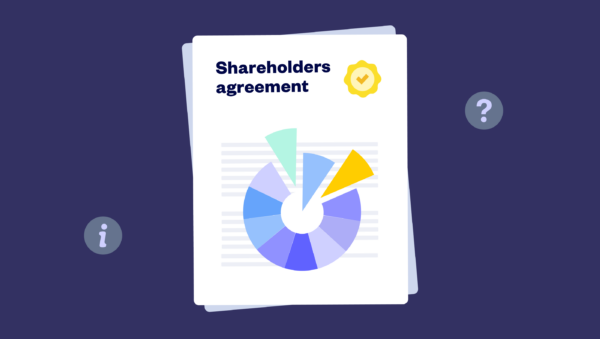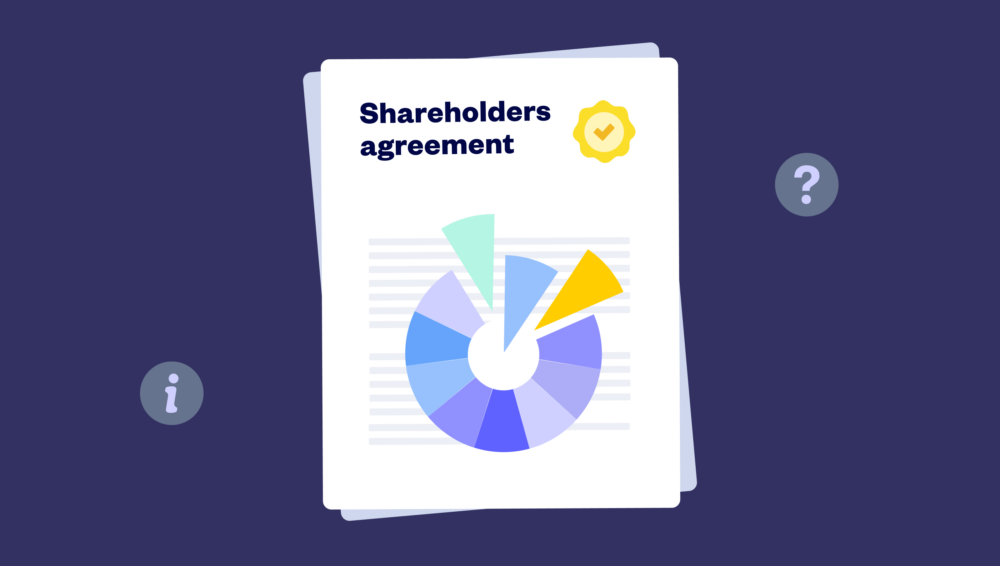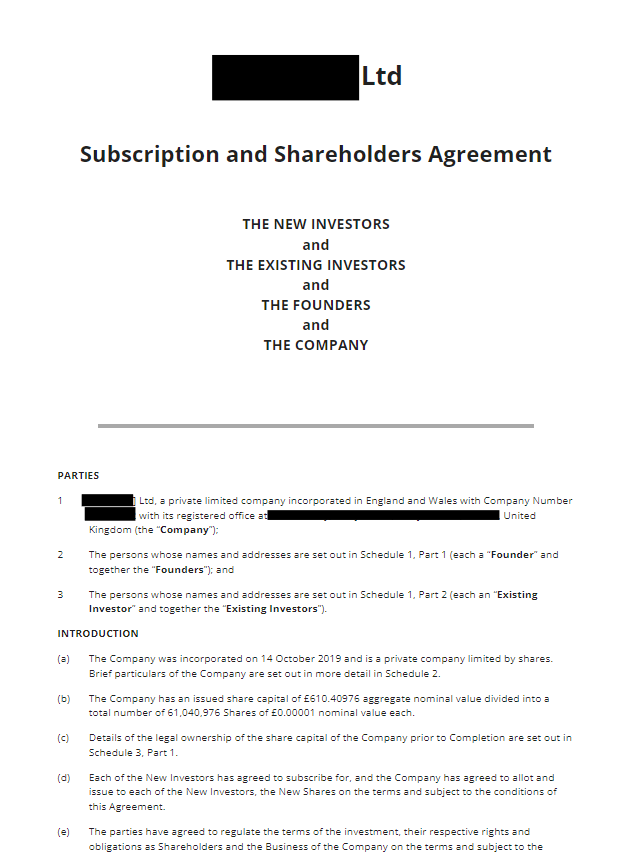The compounding startup: how small decisions create long-term advantage.
Discover how small, consistent decisions compound over time to shape startup success. In this webinar, Anthony Rose and...


The Shareholders Agreement outlines the shareholders’ rights and sets the ground rules for how the company operates. At the end of your funding round, new investors sign the Shareholders Agreement along with all existing shareholders.
In this post, we explain what exactly a Shareholders Agreement contains, when you need one and how to create a rock-solid document that protects your business and sets the tone for a healthy relationship with your investors.
The Shareholders Agreement is a legally-binding contract between the shareholders of a company.
Along with the Articles of Association, the Shareholders Agreement outlines the relationship between the shareholders and how the company operates on a day-to-day basis.
It covers everything from voting rights and decision-making processes to what happens if someone wants to sell their shares or if the company chooses to raise more money.
The main purpose of the Shareholders Agreement is to:
Your Shareholders Agreement should be signed by
It’s common for the Shareholders Agreement to be signed by all shareholders to ensure everyone is bound by the same terms. Sometimes the Shareholders Agreement is signed only by shareholders with voting rights, mainly to exclude employees with non-voting shares who wouldn’t benefit from any rights under the Shareholders Agreement. This can speed up the signing process but remember that shareholders who don’t sign the agreement will not be bound by it. If there are any terms you want all shareholders to comply with (for example, confidentiality obligations) then you should make sure all shareholders sign the agreement.
When you use SeedLegals to create your Shareholders Agreement, you can select whether the Shareholders Agreement will be signed by voting shareholders or all shareholders.
There’s no legal requirement to have a Shareholders Agreement. But it’s one of the critical documents that formalises the investment made into your company.
Some founders want to create a Shareholders Agreement before they take investment, when it’s just the founders and some team members in the company. This is an unnecessary step, because you’ll have to create a new Shareholders Agreement that reflects the deal terms you’ve agreed with your new investors in the round.
This doesn’t mean that you can’t protect your company by putting in place the fundamentals. Vesting, schedules leaver provisions, IP assignments, non-disclosure and non-compete clauses – these can all be covered by the appropriate founder, advisor and consultancy agreements instead.
Create founder, advisor, consultant, employee agreements for free as part of your SeedLegals membership.
Start drafting
Then, when you are ready to close your round, you can create a Shareholders Agreement, exactly aligned with the rest of your funding round documents – rather than paying up front for something you’ll need to change anyway.
Kim HahneDo you still need a Shareholders Agreement when you’re raising via a SeedFAST or Instant Investment?
The rising popularity of agile funding has been great for founders, because it lets you take in funds more quickly and flexibly than ever before. But it’s still just as important to have a Shareholders Agreement in place, otherwise you leave yourself and your business open to risk.
With a SeedFAST, you have more time to get a Shareholders Agreement in place because investors are pre-paying for shares they will receive later. You only need to get a Shareholders Agreement signed before the longstop valuation, the point at which the investment converts into equity.
With Instant Investment, your investors give cash immediately in return for equity immediately – at the same terms of any existing documents (for example, an existing Shareholders Agreement or Articles of Association). The risk here is that without a new Shareholders Agreement in place you are ultimately giving these new investors equity into the business without any additional protection and, most likely, into a share class that has been designed for you as a founder… potentially giving away much more decision-making power than you intended.
If you’ve already done a seed round with SeedLegals – great! Your new shareholders will sign up to the same terms as the shareholders in your previous seed round. If you haven’t already raised or don’t have a Shareholders Agreement in place, it might be better to do a seed round first and then continue to raise with Instant Investment later.
Funding Strategist,
As your startup grows and evolves, your Shareholders Agreement might need a refresh to keep pace with the changes. You’ll want to consider amending it if you bring in new investors, change your business structure, or experience a significant shift in ownership. Any major change in your company’s landscape is a good time to revisit the agreement.
A new funding round is also a good time to review and update the terms. Or, if you’re happy to continue on the same terms, here’s where a Deed of Adherence comes into play. When a new shareholder joins the company, they’ll need to sign this deed, which basically means they agree to be bound by the terms of the existing Shareholders Agreement. It’s a straightforward way to ensure everyone’s on the same page without needing to rewrite the entire agreement every time a new person comes on board.
When you’re pulling together a Shareholders Agreement during a funding round, you’re creating the rules of engagement between the founders, investors, and other shareholders.
The Shareholders Agreement typically covers things like investor rights, founder responsibilities, and what happens in different scenarios – like if a founder leaves or if there’s an acquisition offer on the table. We explain the main considerations behind each term more fully in Term Sheet Negotiation.
Here are the foundational terms your Shareholders Agreement should include:
Investor consent
These terms give investors the right to veto certain key decisions. These decisions include payments and salaries over a certain amount and debts taken on by the company – but they can extend to almost all elements of the company’s business. The Shareholders Agreement lists which matters shareholders have veto power over.
Read more: Investor consent
Directors and board meetings
Investors often want a say in how the company is run. Your agreement should outline how board seats are allocated and what decisions require board approval. This is crucial in setting expectations around governance.
These terms detail how often the board must meet, who’s eligible for the chair position and what falls under the board’s control. Your Shareholders Agreement should also specify the maximum number of directors and how many of those directors the founders can appoint.
Warranties
Warranties are assurances that founders give to the investors about the company’s current state. These might include claims that the company has no hidden debts, that its intellectual property is protected, and that there are no ongoing legal disputes. Including warranties in the agreement gives investors peace of mind, ensuring they have a clear picture of the company they’re backing.
Information rights
Investors often require specific information rights, which allow them access to financial reports, business updates, and other key metrics. This transparency is critical for keeping investors informed about the company’s performance.
Restrictive covenants
Restrictive covenants are clauses that prevent founders from leaving to join or start competing businesses during and after their time at the company. These restrictions protect the startup from losing talent or having proprietary knowledge used against it by competitors.

It’s easy to mix up the Shareholders Agreement and the Articles of Association, especially when you’re navigating your first funding round. While they both set out rules for how your company is run, they serve different purposes and audiences.
The Articles of Association is a public document that governs your company’s internal management. It’s a legal requirement for all companies and gets filed at Companies House, making it accessible to anyone who wants to see it. The articles set out the framework for the company—things like issuing shares, how directors are appointed, and what rights shareholders have. Think of it as the rulebook that every company must have, but it’s pretty generic and not always tailored to your specific situation.
The Shareholders Agreement is a private contract between the shareholders. Unlike the articles, this document isn’t public, so you have more flexibility to set the terms that work for you and your investors.
You might be tempted to write your own Shareholders Agreement, especially when you’re watching every penny in the early days. There are plenty of free or low-cost templates out there, and they can be a useful starting point. But a Shareholders Agreement is a critical legal document – it’s the blueprint for how your company operates and how power is distributed among shareholders. It’s worth taking the time to get it right.
Templates can give you a general framework, but they won’t reflect the unique dynamics of your business, your investor relationships, or your long-term goals. The last thing you want is to find out down the line that a key issue wasn’t covered, or that a vague clause leaves room for conflict. And once you’re in a dispute, trying to fix it can be much more expensive and disruptive than getting it right from the start.
That’s why it’s a good idea to bring in legal support when creating your Shareholders Agreement. At SeedLegals, we combine the benefits of time and cash-saving automating backed by expert support at every stage.
When you do your funding round with SeedLegals, all the documents you need are included in the price you pay – no hidden surprises or extra charges.
It’s simple and stress-free to create a Shareholders Agreement on SeedLegals. Answer a series of questions – with help text and general guidance to help you – to build your documents. You can share it with investors for e-signing and store it securely on SeedLegals.
And our team of funding experts is on hand, all included, to help you every step of the way.
Founders have raised over £2 billion on SeedLegals. We have more insight into early-stage deal terms than anyone else and use that insight to empower founders to choose terms that are fair and market-standard. Choose a time to talk with a funding strategist to find out how we can help.







